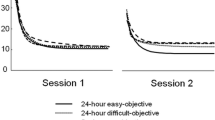Abstract
An experiment is described showing that learned helplessness deficits are produced by prior exposure to uncontrollable outcomes rather than perceived failure. Although the controllability manipulation did produce differences in perceived success or failure, similar differences were also induced by means of instructional feedback. These latter differences, within the controllable and uncontrollable groups, were not associated with poorer performance by subjects given failure feedback. Moreover, the instructional feedback did not influence subjects' perceptions of controllability or uncontrollability. The results confirm that helplessness deficits cannot be explained as reactions to task failure.
Similar content being viewed by others
References
Abramson, L. Y., Seligman, M. E. P., & Teasdale, J. D. (1978). Learned helplessness in humans: Critique and reformulation.Journal of Abnormal Psychology, 87 49–74.
Coyne, J. C., Metalsky, G. T., & Lavelle, T. L. (1980). Learned helplessness as experiment-induced failure and its alleviation with attentional redeployment.Journal of Abnormal Psychology, 89 350–357.
Dyck, D. G., Vallentyne, S., & Breen, L. J. (1979). Duration of failure, causal attributions for failure, and subsequent reactions.Journal of Experimental Social Psychology, 15 122–132.
Frankel, A., Snyder, M. L. (1978). Poor performance following unsolvable problems: Learned helplessness or egotism?Journal of Personality and Social Psychology, 36 1415–1423.
Griffith, M. (1977). Effects of noncontingent success and failure on mood and performance.Journal of Personality, 45 442–457.
Hiroto, D. S., & Seligman, M. E. P. (1975). Generality of learned helplessness in man.Journal of Personality and Social Psychology, 31 311–327.
Locke, E. A., Frederick, E., Lee, C., & Bobko, P. (1984). Effects of self-efficacy, goals, and task strategies on task performance.Journal of Applied Psychology, 69 241–251.
Locke, E. A., Shaw, K. N., Saari, L. M., & Latham, G. P. (1981). Goal-setting and task performance: 1969–1980.Psychological Bulletin, 90 125–152.
Nisbett, R. E., & Wilson, T. D. (1977). Telling more than we can know: Verbal reports on mental processes.Psychological Review, 84 231–259.
Oakes, W. F., & Curtis, N. (1982). Learned helplessness: Not dependent upon cognitions, attributions, or other such phenomenal experiences.Journal of Personality, 50 387–408.
Roth, S. (1980). A revised model of learned helplessness in humans.Journal of Personality, 48 103–133.
Roth, S., & Kubal, L. (1975). Effects of noncontingent reinforcement on tasks of differing importance: Facilitation and learned helplessness.Journal of Personality and Social Psychology, 32 680–691.
Seligman, M. E. P. (1975).Helplessness. San Francisco: Freeman.
Thornton, J. W., & Jacobs, P. D. (1972). The facilitating effects of prior inescapable/unavoidable stress on intellectual performance.Psychonomic Science, 26 185–187.
Tiggemann, M. (1981). Noncontingent successversus noncontingent failure and learned helplessness.Journal of Psychology, 109 233–238.
Tiggemann, M., Barnett, A., & Winefield, A. H. (1983). Uncontrollability versus perceived failure as a determinant of subsequent performance deficits.Motivation and Emotion, 7 257–268.
Wortman, C. B., & Brehm, J. W. (1975). Responses to uncontrollable outcomes: An integration of reactance theory and the learned helplessness model. In L. Berkowitz (Ed.),Advances in experimental social psychology (Vol. 8). New York: Academic Press.
Author information
Authors and Affiliations
Additional information
This research was supported by Research Grant A28015473 from the Australian Research Grants Scheme.
Rights and permissions
About this article
Cite this article
Winefield, A.H., Barnett, A. & Tiggemann, M. Learned helplessness deficits: Uncontrollable outcomes or perceived failure?. Motiv Emot 9, 185–195 (1985). https://doi.org/10.1007/BF00991575
Issue Date:
DOI: https://doi.org/10.1007/BF00991575




